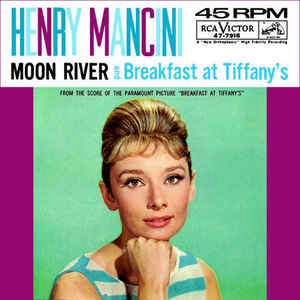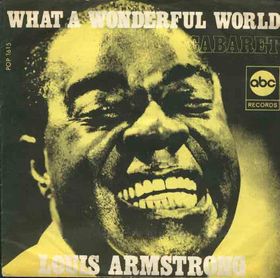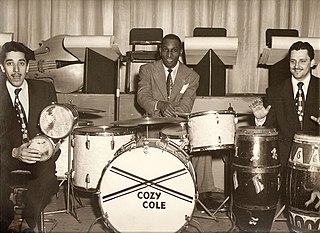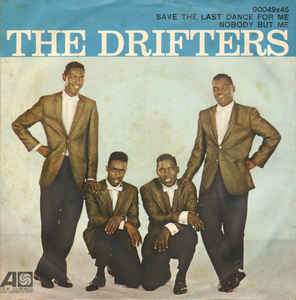Related Research Articles
"Mack the Knife" or "The Ballad of Mack the Knife" is a song composed by Kurt Weill with lyrics by Bertolt Brecht for their 1928 music drama The Threepenny Opera. The song tells of a knife-wielding criminal of the London underworld from the musical named Macheath, the "Mack the Knife" of the title.

"Moon River" is a song composed by Henry Mancini with lyrics by Johnny Mercer. It was originally performed by Audrey Hepburn in the 1961 movie Breakfast at Tiffany's, winning an Academy Award for Best Original Song. The song also won the 1962 Grammy Awards for Record of the Year and Song of the Year. In 1999, Mancini's recording was inducted into the Grammy Hall of Fame.

"What a Wonderful World" is a song written by Bob Thiele and George David Weiss. It was first recorded by Louis Armstrong and released in 1967 as a single. In April 1968, it topped the pop chart in the United Kingdom, but performed poorly in the United States because Larry Newton, the president of ABC Records, disliked the song and refused to promote it.

Small Talk is the seventh album by Sly and the Family Stone, released by Epic/CBS Records in 1974. This album was the final LP to feature the original Family Stone, which broke up in January 1975.
Shadrach or Shadrack may refer to:

The Burning Fiery Furnace is an English music drama with music composed by Benjamin Britten, his Opus 77, to a libretto by William Plomer. One of Britten's three Parables for Church Performances, this work received its premiere at the St Bartholomew's Church, Orford, Suffolk, England, on 9 June 1966 by the English Opera Group.

"Ramblin' Rose" is a 1962 popular torch song written by brothers Noel Sherman (words) and Joe Sherman (music) and popularized by Nat King Cole. The recording by Nat King Cole reached No. 2 on the Billboard Hot 100 chart in 1962.

William Randolph "Cozy" Cole was an American jazz drummer who worked with Cab Calloway and Louis Armstrong among others and led his own groups.

"Save the Last Dance for Me" is a song written by Doc Pomus and Mort Shuman, first recorded in 1960 by American musical group the Drifters with Ben E. King on lead vocals. It has since been covered by several artists, including Dalida, the DeFranco Family, Emmylou Harris, Dolly Parton, and Michael Bublé.

"Shadrach" is a song by American hip hop group Beastie Boys, the 13th track on their second studio album Paul's Boutique (1989). It was released as the album's second single on October 30, 1989, as a 7-inch vinyl backed with the non-album track "And What You Give Is What You Get". Both songs appear on the EP An Exciting Evening at Home with Shadrach, Meshach and Abednego (1989).

"Al di là" ("Beyond") is a song written by Italian composer Carlo Donida and lyricist Mogol, and recorded by Betty Curtis. The English lyrics were written by Ervin Drake. The song was the Italian entry in the Eurovision Song Contest 1961, performed in Italian by Curtis at the Palais des Festivals in Cannes, France, on 18 March 1961, after Curtis had won the Sanremo Music Festival 1961 on 2 February.

Shadrach, Meshach, and Abednego are figures from chapter 3 of the biblical Book of Daniel. In the narrative, the three Jewish men are thrown into a fiery furnace by Nebuchadnezzar II, King of Babylon for refusing to bow to the king's image. The three are preserved from harm and the king sees four men walking in the flames, "the fourth ... like a son of God". They are first mentioned in Daniel 1, where alongside Daniel they are brought to Babylon to study Chaldean language and literature with a view to them serving at the King's court, and their Hebrew names are replaced with Chaldean or Babylonian names.

"Everybody Loves My Baby", also known as "Everybody Loves My Baby, but My Baby Don't Love Nobody but Me", is a popular and jazz standard song composed by Spencer Williams in 1924. Lyrics were written by Jack Palmer.

The discography of Beastie Boys, an American hip hop group, consists of eight studio albums, four compilation albums, five video albums, seven extended plays, 40 singles and 44 music videos.
"Cabaret" is the title song of the 1966 musical of the same name, sung by the character Sally Bowles. It was composed by John Kander, with lyrics by Fred Ebb.
Robert Hunter MacGimsey was an American composer. His most famous song was "Sweet Little Jesus Boy" (1934), a well-known Christmas carol written in the style of an African-American spiritual.
"You Can Depend on Me" is a song written by Charles Carpenter, Louis Dunlap and Earl "Fatha" Hines. and first recorded by Louis Armstrong. It should not be confused with the song of the same name, "(You Can) Depend on Me," recorded by Smokey Robinson and The Miracles in 1959.
"It Keeps Right On a-Hurtin'" is a song written and recorded by Johnny Tillotson, which was a major hit for him in 1962. It has been recorded by many other artists.

"Here We Go Again" is a country music standard written by Don Lanier and Red Steagall that first became notable as a rhythm and blues single by Ray Charles from his 1967 album Ray Charles Invites You to Listen. It was produced by Joe Adams for ABC Records/Tangerine Records. To date, this version of the song has been the biggest commercial success, spending twelve consecutive weeks on the US Billboard Hot 100 chart, peaking at number 15.
"Send Me the Pillow You Dream On" is a country song written and recorded by Hank Locklin. The song has become a standard for the Nashville sound, and has been covered by pop, country, and bluegrass artists.
References
- ↑ "Music Items" (PDF). Billboard. April 29, 1939. p. 14. Retrieved 25 December 2018.
- ↑ Billboard Hot 100 dated February 17, 1962
- ↑ "Shadrack" at allmusic.com
- ↑ "Shadrach" at allmusic.com
- ↑ "www.discogs.com". discogs.com. Retrieved January 14, 2023.